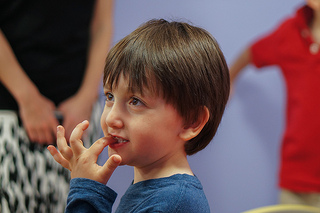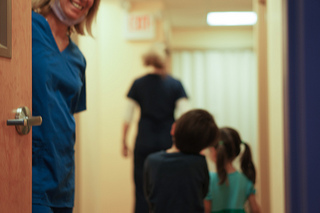Speech Language Pathologists
What is a Speech-Language Pathologist (SLP)?

Speech-language pathologists assess and treat individuals throughout their lifespan with speech disorders, language disorders, cognitive-communication disorders, and swallowing disorders. SLPs are also called speech pathologists, speech therapists, or speech teachers.
Did you know?
3 million Americans stutter?
Education & Licensing
SLPs should hold their Certificate of Clinical Competency in Speech-Language Pathology (CCC-SLP). This is an internationally recognized professional credentialing from the American Speech-Language and Hearing Association (ASHA).
In order to obtain the Certificate of Clinical Competency, SLPs must complete graduate training at an accredited program of at least 36 semester credit hours. Training includes coursework in normal development courses, anatomy and physiology of the speech and hearing mechanisms, neurology, and coursework in various related disorders.
Additionally, graduate students must complete the following:
- Required practicum experience: a minimum of 400 hours in various pediatric and adult settings (e.g. hospital, school, nursing home, clinics)
- National examination: the Praxis
- One clinical fellowship year (1260 hours)
- State license in speech-language pathology
Additional reading: Why Choose an ASHA-Certified Speech-Language Pathologist (pdf)
Did you know?
52.3 % of SLPs work in school-based settings.
Additional reading: American Speech-Language-Hearing Association. (2008). Your job…your career 2007
Where do SLPs work?
- Public and private schools
- Private practice offices
- Hospitals
- Rehabilitation centers
- Nursing facilities
- Community outpatient clinics
- Colleges and universities
- State and federal government agencies
- Home health agencies
- Centers for persons with developmental disabilities
- Research laboratories

Did you know?
8.5% of all SLPs who work in healthcare settings are in pediatric hospitals (21.1% in a general medical center)
Additional reading: ASHA SLP Health Care Survey 2005
Who refers to SLPs?
- Pediatricians, Otolaryngologists and other physicians
- Teachers
- Parents
- Adult patients themselves
- Allied therapists (ie. occupational therapy, physical therapy, psychology, vision therapy)
- Dentists

